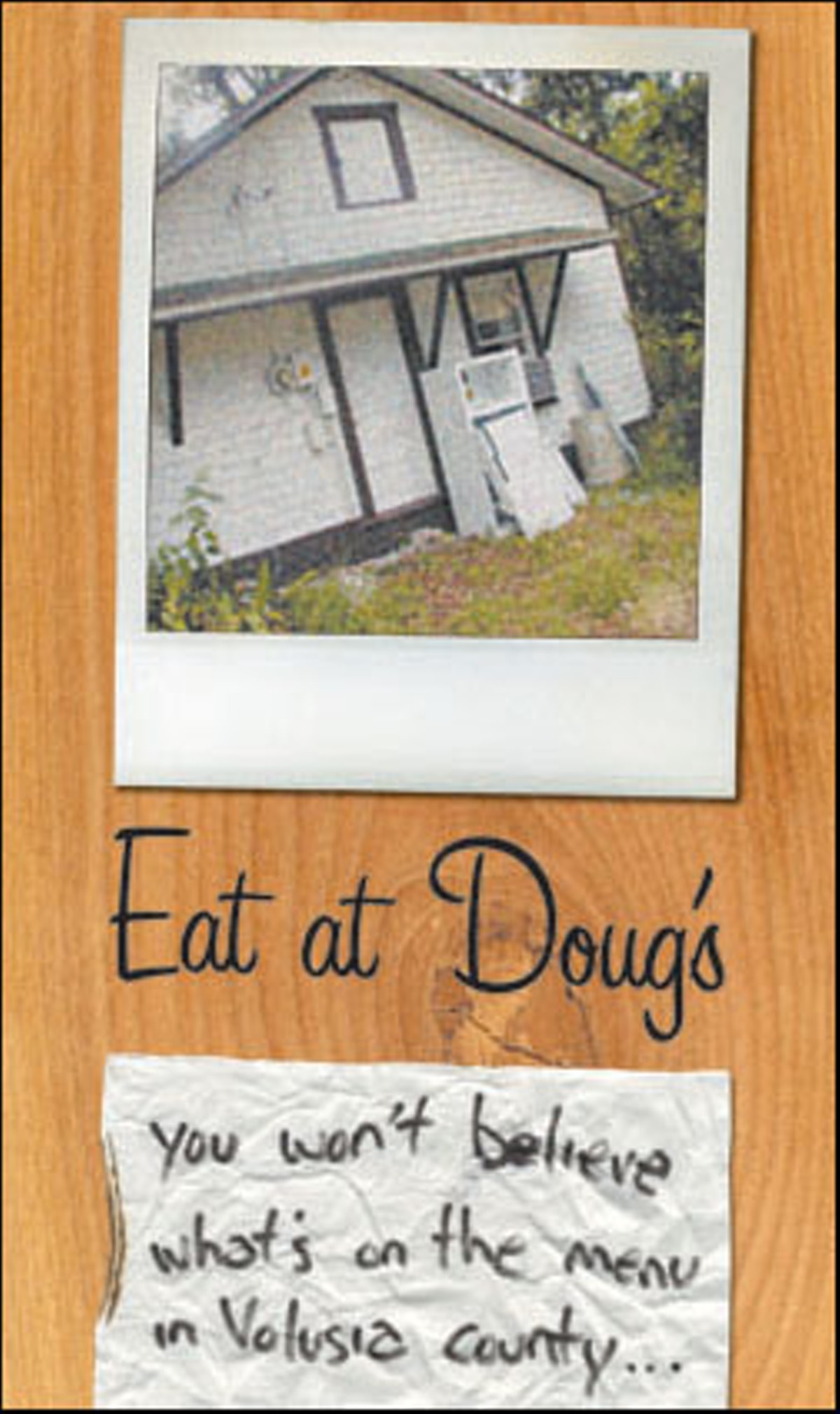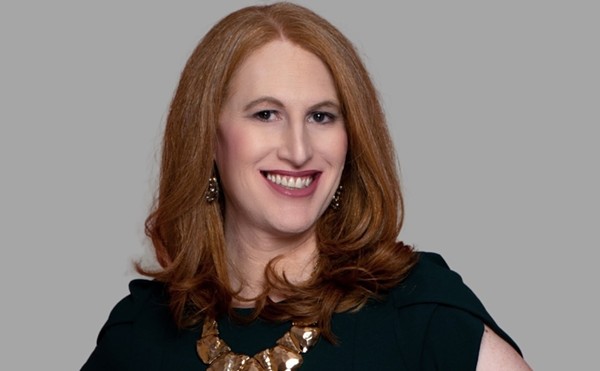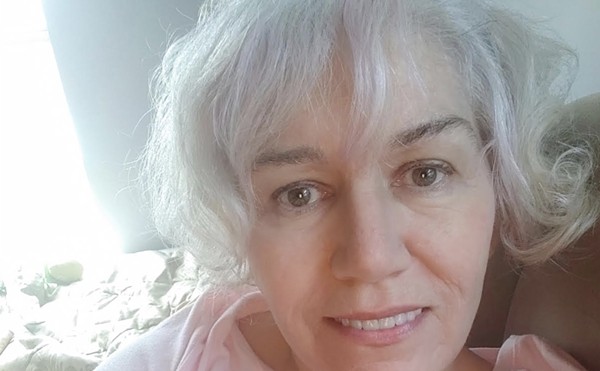Somewhere in Volusia County, in a patch of scrub pine dense enough to block the wind but not the sun, is a sinister-looking building — a cross between a house and a shack — that looks like the kind of place you'd find corpses stacked like cordwood. There's a loud, gas-powered generator droning away near the side, and a bright orange extension cord running up through a boarded window. A small, hand-lettered, cardboard sign on the door reads, "dougs." No apostrophe.
It isn't Doug's house; there is no Doug. The name is an inside joke, and inaccurate at that. More on that later.
On April 29, a Tuesday, I took the phone call that led me to that shack. It was from a guy named Jim, no last name. He called me late, at home.
I'd been researching a story on manatee protection zones. Boaters and fishermen vs. environmentalists, sea cows scared by propellers, etc. An old story in Florida, but evergreen. During my research, Rick Rescott, a towboat operator from Brevard County, was sentenced for a ticket he got while speeding in a manatee protection zone en route to rescue a sinking vessel in April 2002. Rescott refused to pay the $100 fine, which he called "ludicrous," and was convicted by a federal judge of "unlawful waterborne activity" April 21. He was looking at six months in federal prison and a $250,000 fine. He got a $400 fine and says he'll appeal.
Then there was the flap in Volusia County between the Save the Manatee Club, the Florida Wildlife Federation and the Environmental Protection Agency, which hadn't really taken manatees very seriously, failing to create new boat speed zones. But they finally got together, right before a federal judge held U.S. Interior Secretary Gail Norton in contempt of court for failing to protect sea cows.
Jim, no last name, got my home phone number from Dale Koontze, a Bithlo-based boating activist with a "grassroots" group called Stopping Petty Environmentalists Everywhere Daily (SPEED, get it?). I interviewed Koontze in his garage for the story, despite the fact that, as far as I could tell, his group consisted primarily of himself, his cousin Lenny Staver, and a neighbor of Koontze's who never said a word and wouldn't tell me his name.
Koontze is about 5-feet, eight-inches tall and at least 200 pounds. He wore greasy jeans and an inexplicably spotless white dress shirt. In the course of two hours, he put away seven Bud Lights, nine Marlboro Mediums and two packages of beef jerky. He also managed to connect the protected status of manatees to the highest levels of the "Democrat party" under Clinton's "reign of terror."
"It's not a goddamn coincidence that bitch Janet Reno is from Florida, and we get these water zones," he told me. Manatees are not now, and never were, endangered, he added. "Fucking environuts. Ever seen one of 'em enjoying themselves out on a day of fishing?"
I admitted that I hadn't, but only because I wanted to leave and questioning Koontze would surely mean enduring him for another half hour at least.
I've got to think, however, that Koontze perceived my disinterest as empathy, because he passed my business card on to Jim, no last name, who handed me the biggest story of my career on a greasy, worn, chipped piece of china.
Down the river
Jim called two days later. I didn't recognize his voice, and the caller I.D. said "unknown."
"I really think you should meet with me. I really think we have something important to add to your manatee article," he said.
I met him two days later in the parking lot of a Brevard County 7-11 (per my agreement with Jim, I won't get more specific) at 10 a.m. He wouldn't meet me at his house. If I knew his address, he reasoned, I could easily find out his last name.
He was tall and wiry, and exuded a certain nervous energy. He wore a fishnet baseball cap, a thin, polyester work shirt and grease-stained black jeans. He chain-smoked and kept a Styrofoam cooler full of Natural Light in his pickup truck between the driver and passenger seats.
We shook hands, and he told me to get in the truck. "Leave your camera in your car," he said. "We'll provide the pictures."
We drove north on I-95 for about 30 minutes, entering from State Road 520 just east of Cocoa, and flipping between right-wing talk-show hosts Neil Boortz and Glenn Beck along the way. It was mid-morning on a Thursday, and traffic was light. Jim drove slowly, perhaps because there was an open beer can in his lap, perhaps because his 1991 Ford wasn't up to towing the 12-foot fishing boat hitched to the back.
We stayed on the interstate about 30 minutes, then exited onto State Road 46 and headed west. From there, Jim made a sudden left onto a nondescript dirt road. A half-dozen similar roads followed, all generally pulling us west. Eventually, we pulled up next to a dock.
"That's the St. John's," Jim said, launching the boat and tethering it to the dock. Five minutes later, we were headed south down the river.
"We're almost there," Jim finally said, after an hour of silence. He'd stayed quiet most of the trip, sucking on his cigarettes and listening to Rush Limbaugh on a boom box. I nodded. I sat in silence another 20 minutes, growing increasingly nervous about this expedition with a stranger. You meet strange people in this business, but they're usually harmless in the long run. I was wondering whether Jim here would be the exception to that rule.
It was hot, in the upper 80s, and humid. I was sweating in my collared shirt and jeans. Jim seemed perfectly at home, though his boat was anything but comfortable. It was a mess of discarded beer bottles and cigarette butts. The bottom was sticky with old fish guts. The seats were torn, as was the canopy over the driver's side, so there was no escape from the heat.
Suddenly, Jim steered the boat toward a small wooden dock buried in shrubs. If you didn't know it was there, you would certainly miss it. There was one smaller boat already docked. "We're a bit early," Jim said.
"Early for what?" It was past 2 p.m.
I followed Jim east into the woods — the St. John's River divides Seminole and Volusia counties here — and after five minutes, I'd lost track of my directions. There was no way I could find my way back to the boat on my own. Sometimes we were on a narrow trail, sometimes we weren't. We finally entered a small clearing, occupied by the aforementioned ramshackle building. A derelict refrigerator was tossed out front, the door taken off its hinges. Safety first, even out here.
Jim smiled, the first time all day. "Mr. Billman, you're about to eat at Doug's."
"Who's Doug?"
"You'll see."
Jim knocked. The door opened a crack. I caught a glimpse of a white T-shirt and a stained apron. "Who's your buddy?" the guy inside asked.
"Mr. Billman, from the Weekly. I told you I was bringing him out."
"You're early."
He opened the door. Jim stepped inside and I followed. The smell of greasy, frying meat hung in the air. The place was lit only by three bare light bulbs swinging from the ceiling by extension cords. It took a minute for my eyes to adjust to the gloom. Only then did I make out what appeared to me a makeshift diner, complete with barstools at the counter, and four card tables covered in plastic red-and-white checkered tablecloths. The man at the door motioned to us to sit down at the counter. Jim called him "Bub."
Bub was fat, balding, bearded and greasy. His shoulders were hairy. He worked diligently at the stove, poking a fork into a slab of pinkish meat frying on a propane-fired stove.
"How you want yours?" he asked me.
"I don't. I'm a vegetarian. What is it?"
Bub eyed me skeptically. "A vegetarian? What in the hell for? If God didn't want us to eat meat, he wouldn't have made it so damn tasty."
He chuckled. I shrugged. It wasn't the time or place to get into the philosophy of vegetarianism. I was a bit annoyed. "What does this have to do with my story?" I asked Jim.
He cracked open another Natural Light, smiled, and looked at Bub, who was smiling back. "You want to tell him?" Jim asked Bub.
"Tell me what?"
Jim and Bub watched each other, smirking. Ultimately, Bub couldn't keep quiet anymore. "Mr. Billman, you're about to tear into a 100-percent, grade-A, free-range, Florida-raised dugong steak."
"Dugong?" I asked.
"Manatee."
Deliciously illegal
Actually, it wasn't dugong on the stove. The dugong is a different species than the endangered, West Indian manatee — which is what's apparently for dinner. Both species are members of the sirenian family. But neither Bub nor Jim seemed the type to be hung up on scientific technicalities. And thinking they're eating dugong allows them to call this place "Dougs'." Very clever.
And very illegal. Manatees are protected by both state and federal laws. The Marine Mammal Act of 1972, the Endangered Species Act of 1973 and the Florida Manatee Sanctuary Act of 1978 all make harassing, hunting or killing any marine mammal, including the manatee, punishable by a fine of up to $50,000 and one year in prison. State law calls for a fine up to $500 and 60 months in jail.
The law says you can't chase, feed, disturb, ride or poke a manatee. You can't separate one from its mother, either.
And of course, you can't kill and eat them. If federal and state authorities ever busted this group, the members of Central Florida's most clandestine supper club would find themselves behind bars for a long time.
There are just over 3,000 manatees in Florida today, a number that appears to be growing, albeit slowly. Researchers, however, don't know how many manatees would be in Florida's waters today without man's interference. And they don't know how large the sea-cow population would have to become for a genetically viable population.
Thirty minutes later, with my medium-rare manatee steak still untouched before me — I was hungry, so I nibbled on the fries — there was a knock on the trailer door. Two guys entered and shook my hand without any formal introduction. Bub promptly delivered up two more steaks, with fries on the side, for the newcomers.
Within five minutes, there were three more. Then another three. Then another two. The crowd was all white, all male, all in their late 30s or early 40s. None of them would look out of place at a NASCAR race.
By 3 p.m., there were 13 people inside Dougs, 12 of whom put down at least one steak each. Two more coolers full of canned beer and ice appeared with the crowd.
"I wanted you to meet everyone," Jim said, finishing off the last bite of his steak.
"You all realize how illegal this is?" I asked. Stupid question. If they didn't they wouldn't be meeting here. I wondered aloud if they really wanted me to write about this place.
Bub took off his apron and came out from behind the counter to lay it out for me. I didn't take notes on everything he said, so I'll have to paraphrase here a bit.
Manatee has been a staple in Bub's family since they arrived in Florida in 1883, 14 years before the state enacted its first law protecting manatees. But that didn't stop people from eating them, said Bub. Especially in a tough winter when other game was scarce. Manatees would swim right up to you, they were a good source of protein, and what are you going to do, starve? You could even find them on restaurant menus until the 1960s, if you knew where to look, he says.
But Florida got serious about protecting them in 1967, and that was that. Bub's dad, Enis, and his friends took their tradition underground.
One full-grown manatee can feed three families for two weeks, Bub continued. They weigh some 1,200 pounds and have seven cuts of meat, from the flipper (good ground into meatballs or burgers) to the tail, which is excellent for stewing.
"It's a delicious animal Mr. Billman," he said, looking at my untouched plate. "You really should have a bite."
I was tempted. My animal-rights half was outraged, but I had to respect the club's ballsy defiance of the law. And frankly, the meat didn't look that bad; fork tender but not fatty, just a touch of gristle. I took a poll — it doesn't taste like chicken. Some club members likened it to tuna, others said it was closer to buffalo. One said it was like pork, with a hint of seafood. One guy asked if I'd ever had possum. When I said no, he told me the two were virtually indistinguishable.
Enis and a group of five friends pooled their money and bought 24 acres of land. They built the shack in the 1970s. There's no development for three miles either side, so Doug's is pretty well left alone. (The Polaroid that accompanies this story was taken by Bub six months ago. The refrigerator is still there.)
The club is kept small. Each member pays $300 a year to cover expenses. Bub compares it to a cockfighting club — it's fun if you know everyone involved, he says. That, and there's only so many manatees you can catch and kill before someone notices; the more members you have, the more you have to feed. Guests are allowed, but rare. The only way in is if someone will vouch for you.
Manatees are harder to catch than you might think, says Bub. His father passed down the good hunting spots, all the way from South Florida up the coast and even, if they're in the mood for a drive, near the Gulf of Mexico. Bub does most of the hunting, with help from a couple other club members. They go out early in the morning, usually in the winter.
They chum the water with store-bought cabbage and just wait for one to surface near the boat to nibble. Bub zaps them with a cattle prod, which knocks them out long enough for someone else to tie a rope around its tail. They kill it with a bolt gun, the same kind of mechanism used to slaughter cattle. Then they drag the carcass to a safe spot and load it in the boat, which then goes on a trailer. They trailer the boat to Bub's property ("somewhere in Volusia" is all he would tell me), where it's gutted, skinned and butchered. He's got a large freezer in his garage for the resulting cuts.
They kill between 12 and 15 manatees each year, and the large sea cow provides weekly feasts for club members and plenty of leftovers to take home to the families. When the season is done, club members freeze any meat they may have left over.
I'm at one of the last feasts of the season. They caught the sea cow that's on my plate three weeks ago. Bub won't tell me exactly where.
"I wish we could do this year round," Bub says, forking a piece of manatee steak.
Just like the buffalo
But why was I here?
"We want you to write about something," Bub said. He paused for a second, gathering his thoughts. "Y'know, these tree-huggers and manatee-humpers" — he snickers at his little joke — "are really missing the point. The easiest way to preserve the manatee is to let us eat them."
"You just lost me," I told him.
"You're not seeing the big picture. It works like this: If we could farm manatees — ya'know, catch moms and pops and let them mate, then breed their kids, the population would get bigger, right?"
"In captivity, you mean?"
"Yep. You farm them in warm-water springs — they migrate down here in winter to avoid the cold. And once they build up, people can eat manatees, just like God intended. Anyway, there will be more manatees than there are now too, so everybody wins. It's exactly like buffalo."
But who would want to eat a manatee? More people than you think — at least if you believe Bub.
"We want to start a petition to repeal those manatee laws and let us set up farms," he said. "We've already got one legislator on board. He says if we get 10,000 signatures, he'll bring it up next year. We've got 5,000 already."
He handed me a manila envelope. Inside were 10 photocopied pages of signatures — 20 to a page — below a statement reading: "We the people of Florida believe the government has infringed on our private property rights to protect the manatee. We believe state restrictions on boats and manatees as a natural resource should be repealed immediately, and that the state of Florida should use its resources to convince federal authorities that protections on manatees are overzealous and need to be repealed."
I noted that the word "hunting" doesn't appear anywhere in the petition.
"Politics," Bub said. "We got to play that part down a touch."
(Later, at my office, I called 50 of the phone numbers. As best I could tell, at least 38 of them were legit.)
"Who's the legislator?" I asked.
"David Mowbry."
Mowbry is a name I hadn't heard of. It turns out he's an ex-legislator who served six years in the state House in the 1970s before retiring in Chumuckla, in Santa Rosa County, where he served on the town council for 12 years. He's a first-rate Bible thumper — a Pentecostal — who routinely cited scripture on the House floor and claimed to have the "gift of tongues." He's anti-abortion, pro-guns, wants prayer in school and thinks taxes are unconstitutional. Today, at 73, Mowbry is still a lobbyist with some clout, which makes him a useful ally for people like Bub.
"I don't think it's a half-bad idea," Mowbry said when I finally tracked him down by phone a week later. "Look, we can't go on like it is now. These radical environmentalists want us to give up our boating so these sea cows don't get hurt. The don't want boaters to be able to use their own waterways, their own private property. They're killing the boating industry and costing Florida thousands of jobs. I don't know if I'd want to eat a manatee, but I don't think it's the government's place to say you can't."
Mowbry hasn't yet pitched the idea to Johnnie Byrd — whom he describes as being "too bogged down in that whole budget mess to take up something like this right now" — but he thinks the free-market-loving House speaker will warm to it in time.
Mowbry also thinks the time is right in the statehouse for a move like this. "Jeb Bush is an honest, courageous man," he told me. "He sees things that other politicians don't. I think he can get this done, especially when he won't have to face liberal South Florida at the polls again."
(Bush's office didn't return phone calls seeking comment.)
Repealing the federal laws will be tougher, Mowbry admits. "But we also got a Bush in the White House."
Three hours after I got there, Jim said it was time to leave. Bub apparently liked me. He handed me the club's cardboard sign from the front door and slapped me on the back as I walked out. "Take it," he said. "We can make another."
Eat the evidence
I got home about 8 p.m. that night, sunburned, bone-weary, reeking of smoke and cheap beer, and mentally fatigued. Still, the day had been so unusual, so almost unbelievable, that I stayed up all night transcribing my notes and writing what would become the first draft of this article.
There's an implicit deal, I realize: I get a fantastic story, the hunt club gets a chance to air its views. It's a deal I'll gladly take. A few kooks may rally to the flag, but it's not like manatee munching will become mainstream. Or will it?
The 1994 "Republican Revolution" was built on the concept that government had gone too far invading people's privacy rights for the collective good. The tide is once again flowing in that direction, and the members of Doug's are no doubt hoping they will be swept along with it.
I spent the next week phoning manatee-protection groups and state wildlife officials: None had heard of Doug's, of course, though (mostly discounted) rumors of manatee poachers are common. Said one wildlife official who asked not to be named: "You hear these things from time to time, but there's never any proof. I mean, it wouldn't surprise me at all that people were poaching manatee, but there's not much we can do about it unless we catch them in the act."
Bub and his crew are pretty good at covering their tracks.
Researchers keep tabs on manatee populations through a variety of means, including aerial surveys and satellite tracking (the sea cows are "tagged" and their movements are tracked via GPS). If one of Bub's guys stuns a tagged sea cow, they let it go. No harm, no foul. The latest aerial survey, conducted in January, showed the manatee population at 3,113; other studies show the manatee population is rising in areas where boating restrictions have been put in place.
Manatee deaths are tabulated by found carcasses. But the hunters have that covered too. They don't leave any remains.
According to the Save the Manatee Club, there were 4,672 mortalities in Florida from 1974 to 2002. Of these, more than 1,100 came from boating accidents; 174 came from flood gates or canal locks; 125 were "human related," meaning they were caused by poachers, fishing lines and hooks, litter, etc.; 197 were calves who died shortly after birth; 191 died of cold stress; 625 died of natural causes. The causes of death for an additional 1,426 carcasses could not be determined due to decomposition.
But as the wildlife official points out, the state has no ironclad way of tracking every manatee. If there's no evidence of death, there's no way to know a manatee has been poached. "And if they eat the evidence, well, shit, then we've got nothing," he says.
Jim, no last name, called me a week after our encounter, in part to wonder when the story was running and in part to reassure himself that I wouldn't divulge any confidence he imparted. I hadn't. He asked me if I thought the petition had any chance of passing.
"Honestly, no," I replied. It's a pretty conservative legislature, I told him, but promoting a kill-the-manatees bill would go over like offering amnesty to Osama bin Laden. "It's political suicide," I said. "And besides, even if the Legislature went with it, federal law still makes hunting illegal."
Jim replies, "If more people actually tasted manatee and realized how good it is, and if more people realized how bad these boating laws are, they would be on our side. If there's a debate, I think we'll win in the long run." He laughs. "Until then, there's always Doug's."
I ask Jim if he worries what people will think of him.
"Y'know, Mr. Billman, I'm not real sure. I really don't understand this whole mentality, y'know. Everyone thinks these manatees are so cute and so we shouldn't eat them. But I think cows are kinda cute too, and I eat them all the time, but I never worry about going to jail for it. And manatee's a lot tastier."

















